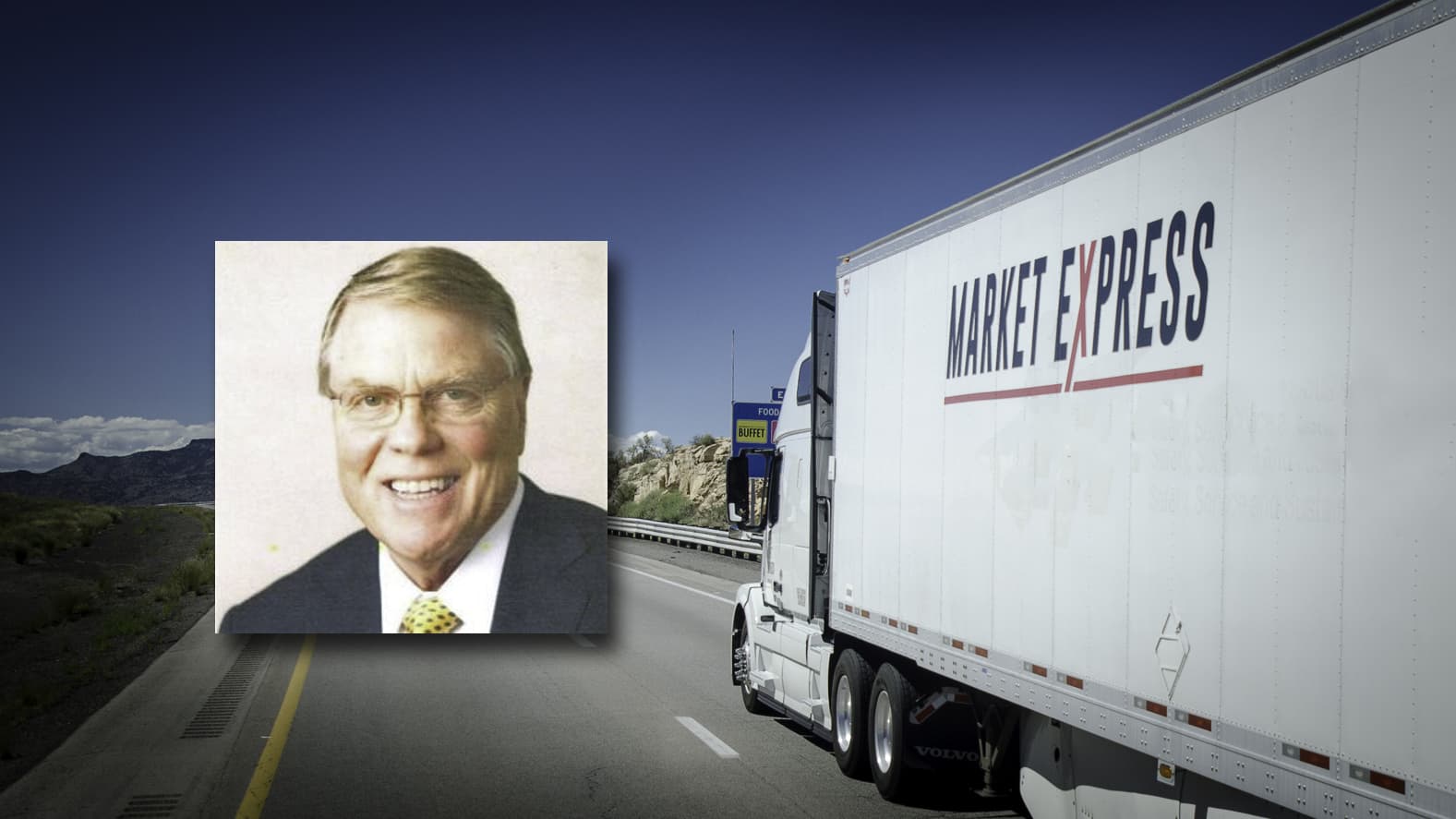
Proving everything old is new, Portland trucking icon’s second venture jumps from zero to $50 million in two years
·
In 1969 while he was a student at Portland State University, Peter Stott started his first trucking company, Market Transport, with a truck he paid for with a loan from a professor, $90 of his own money and a draw against his insurance policy. The company grew to 2,500 employees and contractors and $359 million in revenue. In 2006, Market Transport was sold to UTI Worldwide Inc. for $197 million.
Three years ago Stott got back into the business, launching Market Express with three employees, one truck, one trailer and one driver.
Today the truckload, less-than-truckload and intermodal transportation company is one of the top five regional carriers on the West Coast. It employs 333 staff and contractors, operates 200 trucks and 550 trailers and grossed $50 million in 2018. Revenues in 2019 are expected to clock in at $83 million.
Stott and other members of the executive team sat down with FreightWaves recently to talk about the exponential growth, driver shortages and other challenges and what’s changed about trucking over the past 55 years.
The company owes its success, they said, to a trifecta – a strong economy, a pair of fortuitous acquisitions and one man’s personal brand.
In 2013, Heartland Express purchased Gordon Trucking, a major carrier in Pacific, Washington. That was followed by Heartland’s purchase in 2017 of another big West Coast carrier, Interstate Distributors, based in Tacoma.
“There was fallout from the acquisition that provided some opportunities for us, in addition to there being a strong freight market,” Stott said. “The two things came together at the same time.”
The third factor was Stott himself. Stott is something of an entrepreneurial icon; he founded and was CEO at Crown Pacific, a publicly traded timber management company, served as chief of the commercial real estate firm ScanlanKemperBard Companies and co-founded Columbia Investments, where he continues to serve as president.
He also served 15 years on the board of trucking and logistics firm Con-way.
“Let’s face it – another group similar to ours that didn’t have the profile of ours would have had a much bigger challenge,” said Greg Galbraith, president of Market Express and the former president of Market Transport. “Peter’s reputation speaks for itself. He’s got a Rolodex that allowed us to do some things others wouldn’t be able to do.”
Market Express is primarily an I-5 carrier, with 50 percent of revenue coming from dedicated services. (Interstate 5 is the main interstate highway on the West Coast, running largely parallel to the Pacific coast of the contiguous U.S. from Mexico to Canada.) The company serves mid-size shippers and Fortune 500 companies that transport consumer goods (mostly food and beverage) north and paper products south.
Stott and his team have been aggressive about soliciting business, expanding the company’s geographical reach while staying focused on corridors. The company runs a Denver-Los Angeles-Denver route; Market Express is also starting to run trucks on a Denver-Portland-Los Angeles triangle; as well as a Denver to Kansas City lane.
“Colorado, like Oregon and Washington, has a growing economy with great growth opportunities,” said COO Nick Campos.
In 2017, Market Express purchased Denver-based Westco Express. That added around 60 trucks and helped establish the transportation and logistics company as a regional powerhouse. Looking ahead, the company aims “to add more logos,” said Galbraith, a reference to future acquisitions. “But growth is higher on the organic side,” he said. “It’s much easier to grow organically and frankly we think it’s more profitable. It will be a blend.”
Like other carriers, Market Express said growth depends on its ability to attract and retain the people who work behind the wheel.
“The number one thing that has propelled us forward is we are a ‘respect’ organization,” Campos said. “And the respect standard in this industry is how you treat your drivers. You don’t treat them well, they won’t stay with you. There are plenty of other options for them in this economy.”
Market Express driver salaries average in the mid-$50,000s to over $70,000 for over-the-road.
When Stott got his start in trucking in 1969, there were pay telephones on the highways and typewriters in the office. The weight limit for trucks was 74,000 pounds, and the I-5 freeway northbound from Portland into Washington state was mostly a two-lane road, as was the freeway across the border to California. Hiring a driver involved a one-page, two-sided application, followed by a spin around the block to see if he could shift gears – an automatic transmission in a heavy-duty truck was unheard of.
“A lot of the nuances have changed,” said Stott. But the core business model has not. “If you put technology aside, it’s still the same business as when I started driving 55 years ago. Drivers are still the best sales people for the company.”
Looking ahead, the team aims to ramp up its brokerage service, currently about 20 percent of revenue, as well as its intermodal division, now about 10 percent of business. “We’re going to try and get our customers going with two products instead of one, and if we can get all three, that’s even better,” Galbraith said.
The team talked about regulatory and technology changes roiling the industry.
On the topic of digital freight brokerages, they were politely dismissive. “There are a lot of different spins that are placed on the same way of doing business,” said Campos.
Self-driving technology offers tremendous potential to improve safety and efficiency, they said. “But in the short-run, the hype around autonomous vehicles is a bit discouraging to the industry,” Campos said. “It’s a bit of dis-incentivizer when we claim we can replace drivers with a computer.”
Asked about a cap-and-trade carbon pricing bill making its way through the Oregon legislature, Campos said people often miss the point about trucking and greenhouse gas emissions. “People view trucking as a high carbon footprint business,” he said. “But we’re not. We’re here because the consumer wants to buy from Amazon, or needs a head of lettuce. We’re all high carbon individuals and trucking is a byproduct of that.”
As the industry changes, Market Express soldiers on. By the end of March the team will have relocated from its temporary offices on the premises of the Jubitz Travel Center to an adjacent 17-acre site.
The move marks another back-to-the future moment for the company and Stott, a long-time philanthropist whose name adorns his alma mater Portland State University’s Peter W. Stott Center, the subject of a recent $54 million renovation.
“It all started with Peter’s brand,” said Galbraith, “and we took it from there.”
Article from FreightWaves

